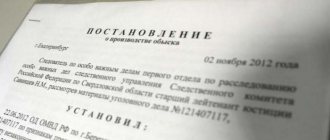The seizure of documents and items from a taxpayer during an on-site inspection by the Federal Tax Service was once considered nonsense, an out-of-the-ordinary event . It was necessary to try very hard for it to come to a seizure, for example, to obstruct the inspection in every possible way. Now this tax control measure is being used more and more widely. And according to recent explanations by the Federal Tax Service, seizure can be carried out not only from the taxpayer, but also from his counterparty.
According to Article 94 of the Tax Code of the Russian Federation entitled “Seizure of documents and items” (section “Tax control”), during an on-site tax audit, the tax inspectorate has the right to seize documents and items related to the audit. The purpose of seizure by the fiscal service is formulated as follows: to confirm with sufficient evidence a violation of tax legislation.
To switch to electronic document management, you must enter into an agreement with an EDF operator and obtain an electronic signature on a certified medium.
We'll tell you all about the transition to EDI at a free webinar on March 2. Hurry up to register.
VLSI Financial Analysis will help you assess the risk of a Federal Tax Service audit. VLSI will promptly notify you of all messages from the tax office, analyze the tax burden, and help you choose the optimal tax system. In addition, it will conduct a comprehensive analysis of the financial condition of the enterprise.
Seizure is illegal without a warrant.
Seizing documents is not a spontaneous process. A situation where an inspector, during an on-site inspection, decided to make a seizure overnight is impossible. Seizure of documents during an on-site tax audit is carried out on the basis of a resolution issued in advance and endorsed by the head of the tax inspectorate (or his deputy) and the tax inspector responsible for a specific on-site tax audit. If the resolution is not endorsed by these officials, then it can be appealed to a higher tax authority and in court.
The resolution must necessarily contain an indication of the reason for which the documents are being seized - the so-called motivation part.
What should be specified in the Resolution:
- date of;
- last name, first name, patronymic, position of the inspector who made the decision, name of the tax authority;
- full name of the taxpayer organization in which the documents are being seized;
- INN and KPP of the taxpayer;
- the reason for the seizure of documents. According to the Tax Code, the seizure must have a motive (justification). Moreover, the justification must be sufficient. It must contain facts and circumstances indicating that the taxpayer intends to destroy, hide, alter or substitute documents.
- description of the documents being seized (a generalized description is allowed);
- date, signature and initials of the responsible person of the taxpayer organization to whom the resolution was transferred. If it is received by a representative, it must be indicated on the basis of which document he has these powers.
Taxpayers often have a question: should they be acquainted with the list of documents expected to be seized? Should this list be written down in the protocol? The answer is negative. Article 94 of the Tax Code on seizure does not contain a mandatory condition for indicating a specific list of documents in the resolution on seizure. The tax authority cannot have advance information about all the documents prepared by the taxpayer when carrying out business activities.
The form “Resolution on the seizure of documents and objects” was approved by Order of the Federal Tax Service of Russia dated November 7, 2018 No. ММВ-7-2/ [email protected] A sample form is attached to the order in Appendix 23.
Commentary on Article 183 of the Code of Criminal Procedure of the Russian Federation
1. Seizure is an investigative action consisting of a procedural forced seizure (fixation) of certain objects and documents that are important to the case, when their location is precisely known.
2. The grounds for seizure are evidence indicating, firstly, the individual characteristics of the item to be seized, and secondly, its exact location in someone’s possession. Thus, unlike a search, during a seizure there are no search actions.
3. The procedure for making a seizure is the same as for a search. In this case, the general rules for conducting investigative actions should be observed. See com. to Art. Art. 164 - 170. Typically, excavation does not require special additional permission (authorization). However, there are a wide range of exceptions to this rule.
4. According to a court decision, a seizure of the home is also carried out - clause 5, part 2, art. 29 of the Code of Criminal Procedure (about this, see part 3 of Article 182) and seizure of documents containing postal and telegraphic items (Article 185 of the Code of Criminal Procedure) and other messages (e-mail). This follows from the direct effect of Art. 23 of the Constitution of the Russian Federation. For more information, see com. to Art. 185.
5. State secret according to Art. 2 Federal Law of July 21, 1993 N 5485-1 “On State Secrets” is information protected by the state in the field of its military, foreign policy, economic, intelligence, counterintelligence and operational activities, the dissemination of which could harm the security of Russia. The list of information constituting a state secret is determined by Decree of the President of the Russian Federation of November 30, 1995 N 1203 “On approval of the List of information classified as state secret” (as amended on June 11, 2011). It is advisable to carry out the seizure of documents containing information that is a state secret in a manner agreed upon with the head of the relevant institution responsible for maintaining this secret. This requirement, in contrast to the Code of Criminal Procedure of the RSFSR (Part 2 of Article 167), has become a recommendation in the current law.
6. The legislation does not define other secrets protected by federal law. Based on Art. Art. 5 and 9 Federal Law dated July 27, 2006 N 149-FZ “On information, information technologies and information protection,” we can conclude that this is information to which access is limited by federal laws—restricted access information. This is an extensive list of information. Seizure of all of them in accordance with clause 7, part 2, art. 29 and part 3 of Art. 183 of the Code of Criminal Procedure (as amended by Federal Law No. 87-FZ of June 5, 2007) must be carried out by court decision. Federal laws provide for the following types of secrets (restricted information):
1) secret of private life, personal, family secret (Part 1 of Article 23 of the Constitution of the Russian Federation);
2) attorney-client privilege (Part 3, Article 8 of the Federal Law of May 31, 2002 N 63-FZ “On advocacy and the legal profession in the Russian Federation”);
3) audit secrecy (Article 9 of the Federal Law of December 30, 2008 N 307-FZ “On Auditing Activities”);
4) bank secrecy (Article 857 of the Civil Code; Article 183 of the Criminal Code; Article 26 of the Federal Law of December 2, 1990 N 395-1 “On banks and banking activities”);
5) medical confidentiality (Article 13 of the Federal Law of November 21, 2011 N 323-FZ “On the fundamentals of protecting the health of citizens in the Russian Federation”, Part 2 of Article 15 of the SK; Article 9 of the Federal Law of July 2, 1992 N 3185-1 “On psychiatric care and guarantees of citizens’ rights during its provision”) <1>;
——————————— <1> Clause 12.1 of the Resolution of the Plenum of the Supreme Court of the Russian Federation dated 03/05/2004 N 1 distinguishes between medical confidentiality about the state of mental and physical health. In the first case, the need for excavation is recognized, but in the second, it is not.
6) commercial, industrial secret or production secret (Article 1465 of the Civil Code; Article 183 of the Criminal Code; Federal Law of July 29, 2004 N 98-FZ “On Trade Secrets”. For the list of information that cannot constitute a trade secret, see Art. 5 Federal Law dated July 29, 2004 N 98-FZ; Decree of the Government of the Russian Federation dated December 5, 1991 N 35);
7) tax secrecy (Article 102 of the Tax Code of the Russian Federation; Article 183 of the Criminal Code);
professional secret (subject to protection in cases where the Federal Law provides for the confidentiality of such information; Article 9 of the Federal Law of July 27, 2006 N 149-FZ “On information, information technologies and information protection”);
9) secrecy of the archive (Article 25 of the Federal Law of October 22, 2004 N 125-FZ “On Archival Affairs in the Russian Federation”);
10) secrecy of voting in elections or referendums (subparagraph “g” of paragraph 10 of Article 30 of the Federal Law of June 12, 2002 N 67-FZ “On the basic guarantees of electoral rights and the right to participate in a referendum of citizens of the Russian Federation”; Article 141 of the Criminal Code );
11) secrecy of the will (Article 1123 of the Civil Code);
12) the secret of the private key of the electronic digital signature (Article 12 of the Federal Law of January 10, 2002 N 1-FZ “On Electronic Digital Signature”);
13) secret of confession (Article 3 of the Federal Law of September 26, 1997 N 125-FZ “On freedom of conscience and religious associations”);
14) secret of the source of information of the mass media or editorial, journalistic secret (Article 41 of the Federal Law “On the Mass Media”). For more information, see com. to Art. 144;
15) secrecy of credit history (Part 4 of Article 7 of the Federal Law of December 30, 2004 N 218-FZ “On Credit Histories”);
16) the secret of transport security objects (part 4 of article 5, part 3 of article 9, part 4 of article 11 of the Federal Law of 02/09/2007 N 16-FZ “On Transport Security”);
17) the secrecy of personal data of citizens (Article 7 of the Federal Law of July 27, 2006 N 152-FZ “On Personal Data”; Article 86 of the Labor Code; Article 12 of the Federal Law of November 15, 1997 N 143-FZ “On Acts of Civil Status”);
18) secrecy of the preliminary investigation (part 9 of article 166, article 161 of the Code of Criminal Procedure);
19) confidentiality of information about a person in respect of whom state protection measures have been applied (Article 9, 21 Federal Law of August 20, 2004 N 119-FZ “On State Protection of Victims, Witnesses and Other Participants in Criminal Proceedings”);
20) the secrecy of performing notarial acts (Article 16, 28 Federal Law of 02/11/1993 N 4462-1 “Fundamentals of the legislation of the Russian Federation on notaries”);
21) secrecy of the deliberation room (Articles 298, 341 of the Code of Criminal Procedure; Article 194 of the Code of Civil Procedure; Article 167 of the Arbitration Procedure Code);
22) secrecy of insurance (Article 946 of the Civil Code; Part 2 of Article 25 of the Federal Law of April 25, 2002 N 40-FZ “On compulsory insurance of civil liability of vehicle owners”);
23) secrecy of adoption (Article 139 of the RF IC; Article 155 of the Criminal Code);
24) the secret of membership in a political party (Part 6 of Article 19 of the Federal Law of July 11, 2001 N 95-FZ “On Political Parties”).
7. Based on Art. 9 Federal Law dated July 27, 2006 N 149-FZ “On information, information technologies and information protection”, we can formulate a general rule applicable to similar cases. Most types of secrets are varieties of professional secrets (information received by individuals in the performance of their professional duties or by organizations in the performance of certain types of activities - Part 5 of the Decree Article). Professional secrets may be provided to third parties in accordance with the Federal Law and (or) by court decision (Part 6 of the Decree Article). Consequently, if the Federal Law provides for the provision of confidential information to the investigator without a court decision, then seizure is not necessary. However, if there are grounds specifically for the seizure of documents (about them, see paragraph 2 of this article), the investigator is authorized to carry it out.
8. The literal meaning of part 3 com. article and clause 7, part 2, art. 29 (as amended by Federal Law No. 87-FZ dated 05.06.2007) leaves uncertainty on the question of whether judicial permission is required to seize bank documents if they relate to the accounts of legal entities and not citizens (as previously amended, paragraph 7, Part. 2 Article 29 the word “citizens” was missing). It appears that these documents contain one of the secrets protected by federal law, the seizure of which, as a general rule, requires a court decision.
How does the excavation work? Procedure.
- The seizure procedure begins with the presentation of the Resolution on seizure.
- It is mandatory that all those present must be informed of their rights and responsibilities during this procedure.
Who should be present during the seizure:
- taxpayer representative,
- witnesses,
- specialist if necessary.
The presence of witnesses is a mandatory condition for the seizure. There must be at least 2 witnesses. An important condition is that only uninterested persons can act as witnesses, that is, employees of the taxpayer or the federal tax service cannot be involved as witnesses.
- After presenting the resolution and stating the rights and obligations, the inspector must invite the taxpayer to voluntarily provide documents and items.
- All seized documents are shown to witnesses and others present at the document seizure procedure.
- Seized documents are numbered, laced and sealed with the seal or signature of the person from whom the seizure is made.
- Based on the results of the seizure, a protocol is drawn up.
- A copy of the protocol is handed over against signature to the taxpayer or his representative from whom these documents and items were seized.
Inspectors have the right to seize original documents. When originals are withdrawn, copies are made of them, which are certified by the official conducting the inspection and handed over to the taxpayer. If it is impossible to make and transmit copies during the withdrawal procedure, they must be issued to the taxpayer within five days from the date of withdrawal.
What's next
After drawing up the protocol, tax officials must familiarize all participants in the seizure procedure with it. And give a copy of the protocol to the company official.
If original documents are confiscated from you, then inspectors are required to provide copies of them certified by an inspection employee. And this cannot be done immediately upon seizure, so the tax authorities have 5 days to make copies, certify them and transfer them to the taxpayer.
By the way, the taxpayer is not obliged to make copies of documents on his own and at his own expense. This is the responsibility of the inspectors and they have no right to force you.
Interesting fact : the legislation does not regulate in any way the procedure and timing for the return of seized original documentation. Be prepared for the fact that nothing will be returned to you until the verification is completed, and maybe even after it is completed. Then you will have to write a letter to the inspectorate asking to return the seized documents, and if that doesn’t help, go to court
If the taxpayer is against seizure. Procedure.
If the taxpayer is against the seizure and refuses to voluntarily release documents and items required by the tax authorities, then the seizure occurs forcibly. Rescheduling, protocols of disagreements, etc. the tools do not work in this case.
- If the taxpayer refuses to voluntarily provide documents, the official has the right to open the premises where documents and items subject to seizure may be located.
- In this case, the premises must be opened “carefully”, avoiding damage to locks, doors, etc.
- All seized documents are shown to witnesses and others present at the seizure procedure.
- Seized documents are numbered, laced and stapled.
- If the taxpayer (his representative) refuses to affix his signature or seal to the seized documents, a corresponding note is made about this in the seizure protocol.
- Based on the results of the seizure, a protocol is drawn up, a copy of the protocol is sent to the taxpayer.
Excavation production - concept
Making a seizure involves conducting an investigative action, the rules and procedure of which are regulated by Article 183 of the Code of Criminal Procedure of the Russian Federation.
Seizure is an investigative action aimed at seizing objects and documents relevant to a criminal case.
The seizure is carried out in the manner prescribed for a search, part 2 of article 183 of the Code of Criminal Procedure of the Russian Federation is a reference to art. 182 Code of Criminal Procedure of the Russian Federation (search)
Seizure is a purposeful investigative action, in the first part of Art. 183 of the Code of Criminal Procedure of the Russian Federation, the legislator establishes that seizure is possible only if it is known where and who has the items to be seized.
What should be indicated in the seizure report.
The form of the Protocol on the seizure, seizure of documents and objects was approved by Order of the Federal Tax Service of Russia dated November 7, 2018 No. ММВ-7-2 / [email protected] and is attached to it in Appendix No. 24.
Contents of the seizure protocol:
- Title of the document;
- place and date of compilation;
- start and end times of excavation;
- position, full name the official drawing up the protocol;
- data of the participants in the seizure (full name, address, etc.);
- information about seized documents and objects;
- excavation results.
How the seized document or item is described:
- Name;
- number of items seized;
- individual characteristics of a seized document or item;
- the value of the seized item (if it is possible to determine it).
Data on seized documents can be reflected both in the protocol itself and in a separate document - an inventory attached to the protocol.
Documents containing secrets
Seizure of documents within the framework of a criminal case may affect state or some other secret, which is protected in a special manner. This also includes documents that contain information about deposits, accounts of citizens, reports of credit institutions and banks. Seizure of documents transmitted via mail or telegraph is also carried out in a special manner.
- First of all, the investigator draws up a petition in which he indicates the grounds for the seizure, the importance and necessity of the documents that will be seized during the process. It is necessary to refer to the provisions of the law, as well as to the factual circumstances of the case being investigated.
- Filing a petition to the court and consideration. At this stage, the court assesses the need for a seizure, especially if a secret is involved. Based on the results of the review, a decision is made.
- The court makes a decision and if permission is given to carry out the seizure, the investigator goes with it to the place.
Grounds for seizure of documents by tax authorities
The tax authorities have a Letter from the Federal Tax Service, which was issued on July 17, 2013 No. AS-4-2/12837. It establishes clear cases when documents may be seized by tax authorities.
- If employees have reason to believe that the taxpayer hides, destroys, replaces or corrects genuine documents by issuing false acts and reports for verification. Because of this, a full-fledged on-site inspection cannot be carried out, which means that employees can conduct a seizure in order to, with the help of experts, determine whether it is a fake or not, on the basis of which to proceed further.
- If the audited organization refuses to provide documents requested by tax officials. That is, the voluntary transfer of documents will not take place, which means that seizure must be carried out forcibly.
- If inspectors need to obtain documents for an examination or inclusion in the materials of a criminal case.
All these grounds are listed in the Letter and are legal grounds for seizure of documents by the tax service.









